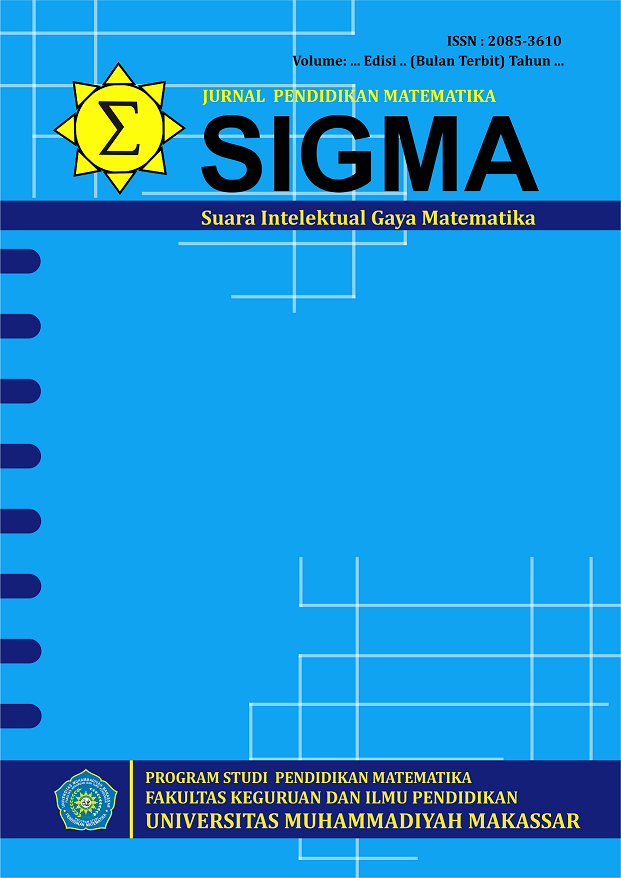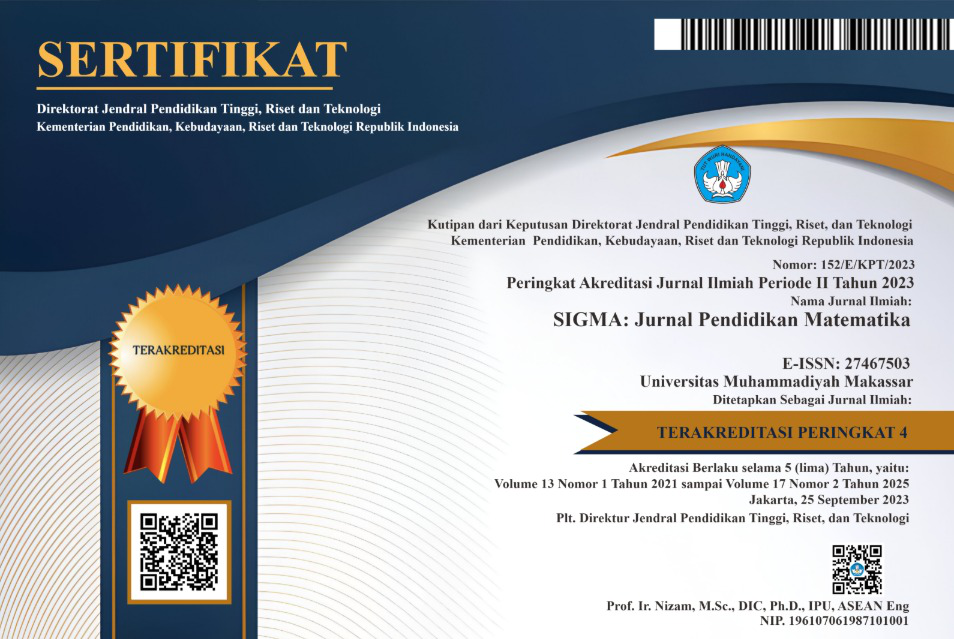PENERAPAN MODEL PEMBELAJARAN BERBASIS MASALAH TERHADAP HASIL BELAJAR MATEMATIKA PADA SISWA SMP
DOI:
https://doi.org/10.26618/sigma.v14i1.7106Keywords:
problem based learning model, mathematics learning outcomesAbstract
The main problem in this study is whether there is a difference in the application of problem-based learning models and direct learning to mathematics learning outcomes in seventh grade students of UPT SMP Negeri 15 Selayar Islands. This study aims to determine the differences in the application of problem-based learning models and direct learning to mathematics learning outcomes in seventh grade students of UPT SMP Negeri 15 Selayar Islands. This type of research is an experimental study involving two classes, namely the experimental class and the control class. This research refers to the learning outcomes of mathematics. The design used in this study is a nonequivalent control group design. The research sample amounted to 64 students. The data analysis technique used is descriptive statistical analysis and inferential statistics using t-test.The results showed that after going through the application of the problem-based learning model, the results of the data analysis of students' mathematics learning outcomes were in the very good category, with an average score of 80% in the experimental class and the results of data analysis of students' mathematics learning outcomes were in the good category with an average score. an average of 70% in the control class. The results of the analysis with the t-test of the results of hypothesis testing using SPSS version 25 software obtained Sig < , ie 0.000 < 0.05 so that H_0 is rejected and H_1 is accepted. This shows that there are differences in the application of problem-based learning models to students' mathematics learning outcomes. The results of observation of student activities 91% of students who actively participate in the mathematics learning process and 94% of students who give a positive response to the application of problem-based learning models (PBM), the implementation of mathematics learning with problem-based learning models with an average of 3.883% of the ideal score of 4, 0. From the results of this study, it can be concluded that there are differences in the application of problem-based learning models and direct learning to mathematics learning outcomes in class VII students of UPT SMP Negeri 15 Selayar Islands in learning mathematics.References
Amri, Sofan. Pengembangan & Model Pembelajaran dalam Kurikulum 2013.Jakarta: Prestasi Pustakaraya, 2013.
Depdiknas, Rencana Strategis Departemen Pendidikan Nasional 2005-2009. (Jakarta: Pusat Informasi dan Humas Depdiknas, 2005),h.9-10.
Ibrahim, 2017. “Perpaduan Model Pembelajaran Aktif Konvensional (ceramah) dengan Cooperatif (Make-S Match) untuk Meningkatkan Hasil Belajar Pendidikan kewarganegaraan”. Jurnal Ilmiah Pendidikan Social, Sains, dan Humaniora Vol.3 No.2, Juni 2017.
Kuswana, W. S., (2011). Taksonomi Berpikir. PT Remaja Rosdakarya, Bandung, (Online), vol.6, No.2, Oktober 2015, hlm. 108, (http://ppjp.ulm.ac.id/journal/index.php/quantum/index, diakses 15 Agustus 2021).
NCTM. (2000). Principles and Standards for School Mathematics. United States of America : The National Council of Teacher of Mathematics, Inc
Nofa, Mutiara Nst & Rahmi. 2017. Pengaruh Penerapan Model Pembelajaran Berbasis Masalah disertai Teknik Berikan Uangnya terhadap Hasil Belajar Matematika Siswa Kelas VIII SMPN 16 Padang. Jurnal Pendidikan Matematika. Vol. 6., No.2., Hal. 273-278.
Satriani, S. 2020. Analisis Kemampuan Pemecahan Masalah dan Kemampuan Penalaran Matematis Siswa Materi Eksponen dan Logaritma. Delta: Jurnal Ilmiah Pendidikan Matematika, Vol 8 No 2, Hal 193 – 200. http://dx.doi.org/10.31941/delta.v8i2.1006
Satriani, S., Usman, MR. 2021. Analisis Kemampuan Komunikasi Matematis Siswa dalam Menyelesaikan Soal Higher Order Thinking Skill (HOTS). Jurnal MathEdu (Mathematic Education Journal), Vol 4 No 2, Hal 236 – 242. https://doi.org/10.37081/mathedu.v4i2.2769
Sugiyono, 2015. Metode Penelitian Pendidikan (Pendekatan Kualitatif, Kuantitatif, dan R&D), Bandung: Alfabeta.
Supatmono, Catur. 2002. Matematika Asyik. Grasindo. Jakarta.
Downloads
Published
Issue
Section
License
With the receipt of the article by the SIGMA: Jurnal Pendidikan Matematika Editorial Board and the decision to be published, then the copyright regarding the article will be diverted to SIGMA: Jurnal Pendidikan Matematika.
Universitas Muhammadiyah Makassar as the publisher of SIGMA: Jurnal Pendidikan Matematika hold the copyright regarding all the published articles in this journal.Universitas Muhammadiyah Makassar has the right to multiply and distribute the article and every author is not allowed to publish the same article that was published in this journal.
The manuscript authentic and copyright statement submission can be downloaded ON THIS FORM.






